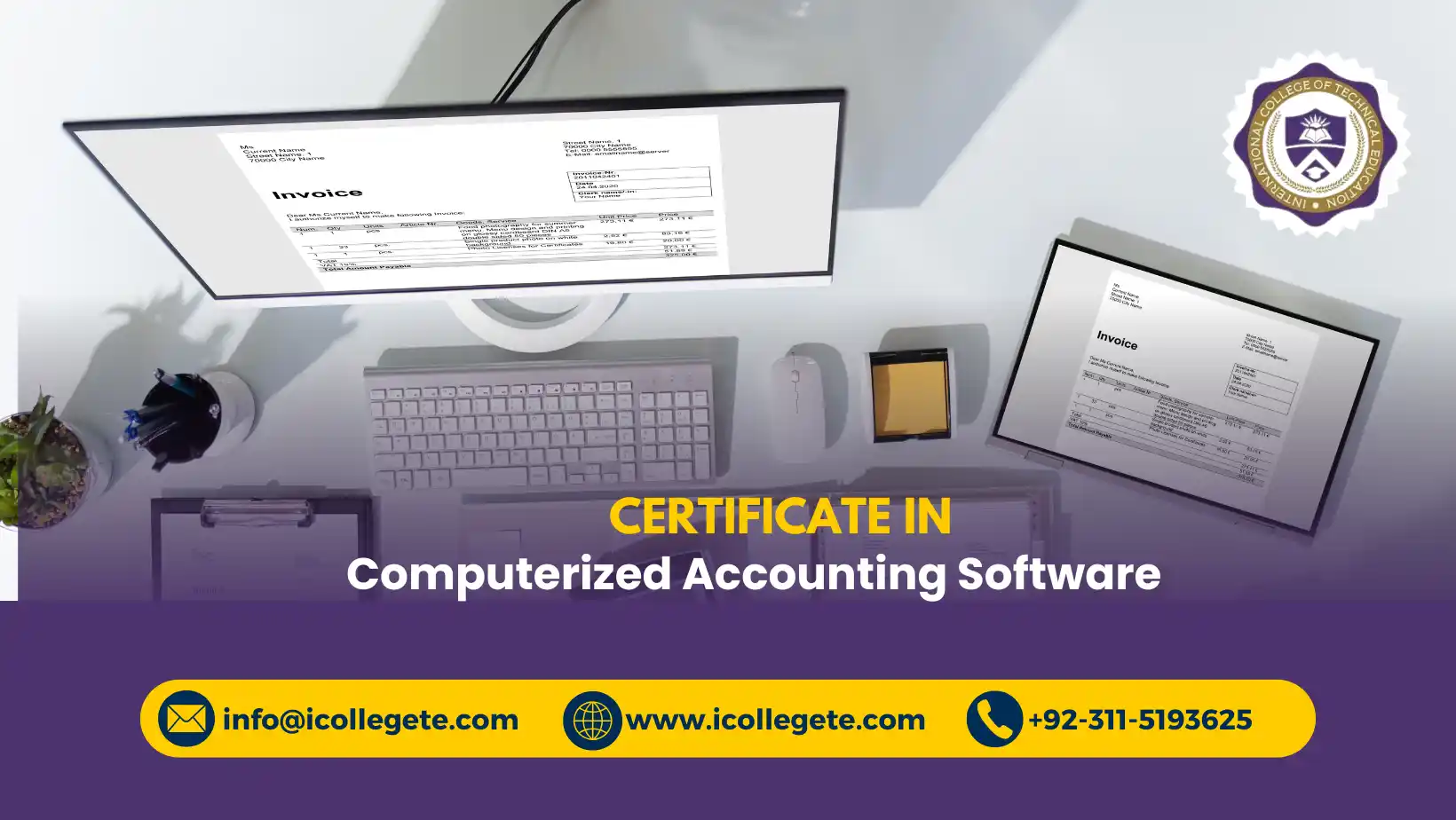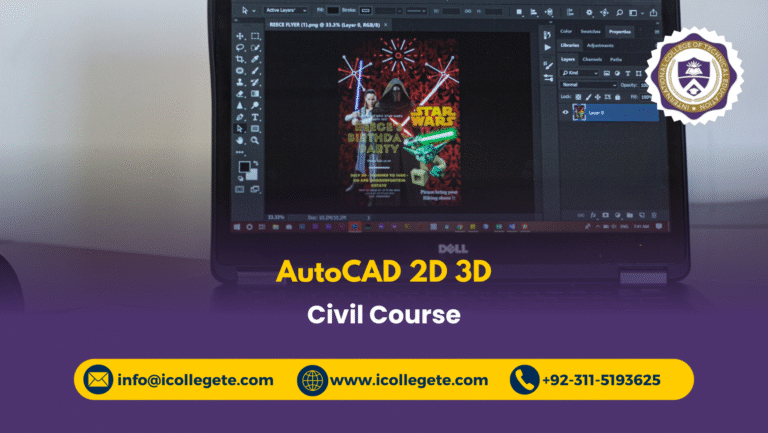In today’s fast-paced business world, traditional methods of accounting are being replaced by advanced computerized accounting systems that offer greater accuracy, efficiency, and convenience. The Computerized Accounting Software Course in Rawalpindi is designed to equip individuals with the essential skills to navigate and use modern accounting software such as QuickBooks, Peachtree, Tally, and others. This course provides practical, hands-on training that prepares individuals for the real-world demands of accounting in both small and large businesses.
The Computerized Accounting Software course is designed to teach participants how to use popular accounting software to manage financial records, prepare reports, and perform other accounting functions. As businesses increasingly move towards automation, knowledge of accounting software is no longer optional but a key skill in the accounting and finance industry. This course helps participants become proficient in various accounting tools, making it an essential stepping stone for anyone looking to pursue a career in accounting or finance.
This course offers comprehensive training in the most widely used computerized accounting software. Participants will learn how to set up and manage financial accounts, process transactions, generate financial reports, and reconcile bank statements, all using accounting software. The course combines theory and practical exercises to ensure that learners can effectively apply their knowledge in a professional setting. By the end of the course, participants will be equipped with the skills necessary to handle a range of accounting tasks efficiently using modern software solutions.
Study Units
The Computerized Accounting Software course is divided into several key modules, each focusing on different aspects of accounting software and its applications:
- Introduction to Accounting Software
- Overview of the role of accounting software in modern accounting.
- Introduction to various software options available (e.g., QuickBooks, Tally, Peachtree).
- Setting Up Accounting Software
- Installation and setup of accounting software.
- Understanding the chart of accounts and configuring it in the software.
- Basic Accounting Functions
- Recording financial transactions (sales, purchases, payments, receipts).
- Understanding debits, credits, and journal entries.
- Generating Financial Reports
- Creating balance sheets, income statements, and cash flow reports.
- Customizing reports for business needs.
- Inventory Management and Reconciliation
- Managing inventory and tracking stock using accounting software.
- Reconciling bank statements and managing accounts payable/receivable.
- Payroll Management
- Setting up employee payroll in the accounting software.
- Managing tax calculations, deductions, and generating payroll reports.
- Taxation and Compliance
- Learning how to handle taxes using accounting software.
- Understanding the process of VAT/GST, income tax, and other statutory deductions.
- Advanced Features and Data Backup
- Exploring advanced software functions such as multi-currency transactions and financial forecasting.
- Backing up and securing accounting data.
Learning Outcomes
Upon completing the Computerized Accounting Software course, participants will be able to:
- Set up and configure accounting software according to business needs.
- Accurately record financial transactions and monitor accounts.
- Generate comprehensive financial reports and interpret accounting data.
- Manage inventory, perform bank reconciliations, and handle accounts payable/receivable.
- Process payroll efficiently using accounting software.
- Understand and apply taxation concepts using the software.
- Back up and secure accounting data to ensure data integrity and compliance.
Course Benefits
- Practical Skills: Gain hands-on experience with leading accounting software, ensuring you are job-ready from day one.
- Industry-Relevant Knowledge: Learn how to use tools that are widely used in the accounting and finance sectors.
- Efficiency and Accuracy: Master computerized accounting techniques that increase speed and accuracy in handling financial tasks.
- Career Advancement: Add a highly sought-after skill to your resume that can lead to better job opportunities and career growth.
- Time-Saving: Learn how to streamline accounting processes, which saves businesses time and reduces the risk of errors.
- Compliance and Reporting: Understand how to use software to ensure compliance with tax regulations and generate accurate financial reports.
Who Is This Course For?
The Computerized Accounting Software course is suitable for:
- Aspiring Accountants: Individuals looking to start a career in accounting or finance.
- Business Owners: Entrepreneurs who want to manage their own accounts and finances efficiently using software.
- Office Managers: Professionals who need to handle day-to-day accounting tasks in small or medium-sized businesses.
- Accounting Professionals: Existing accountants who want to upgrade their skills and switch to computerized accounting systems.
- Students: Those pursuing accounting or finance degrees who want to gain practical, industry-relevant skills.
- Job Seekers: Individuals looking to enhance their employability by acquiring specialized skills in accounting software.
No prior experience in accounting is required, although a basic understanding of accounting principles will be beneficial.
Future Progression
After completing the Computerized Accounting Software course, participants have several pathways for further development and career progression:
- Advanced Accounting Certifications: Pursue certifications like ACCA, CPA, or CMA to deepen accounting knowledge and gain specialized credentials.
- Advanced Software Training: Learn more advanced features of accounting software such as cloud accounting solutions or enterprise resource planning (ERP) systems.
- Financial Analysis: Move into more advanced roles in financial analysis, where knowledge of accounting software can be paired with skills in financial forecasting and budgeting.
- Business Management: Use your accounting knowledge to move into broader business management roles that require financial oversight and decision-making.
- Freelancing/Consultancy: Start your own accounting consultancy firm to help small businesses implement and manage accounting systems.
- Entrepreneurship: If you plan to run your own business, having knowledge of accounting software will be invaluable in handling your own finances and bookkeeping.
The Computerized Accounting Software course in Rawalpindi provides essential training for individuals looking to master modern accounting practices. With practical experience and comprehensive training, this course equips learners with the tools they need to navigate the increasingly digital world of accounting. Whether you’re starting a career in finance, managing a business’s financial operations, or aiming to upgrade your accounting skills, this course provides the foundation and expertise to succeed in the field of computerized accounting.






